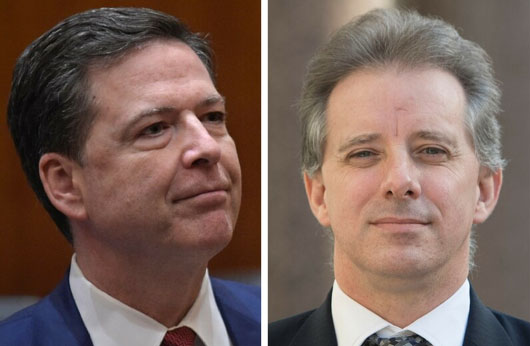by WorldTribune Staff, May 10, 2019
Ten days before the FBI used the Christopher Steele anti-Trump “dossier” to secure a Foreign Intelligence Surveillance Act (FISA) warrant to spy on Trump campaign adviser Carter Page, a State Department official wrote in a memo that a key claim in the dossier was false, a report said.
The FISA request to the court relied heavily on Steele’s dossier which was marked ‘verified application’.

After she had met with Steele, Deputy Assistant Secretary of State Kathleen Kavalec wrote in an Oct. 11, 2016 memo that Steele told her Russia had constructed a “technical/human operation run out of Moscow targeting the election” that recruited emigres in the United States to “do hacking and recruiting,” John Solomon reported for The Hill.
The memo and Kavalec’s handwritten notes summarizing her meeting with Steele were obtained under open records litigation by Citizens United.
Steele’s client “is keen to see this information come to light prior to November 8,” the date of the 2016 election, Kavalec wrote in a typed summary of her meeting with Steele and Tatyana Duran, a colleague from Steele’s Orbis Security firm.
Kavalec quoted Steele as saying, “Payments to those recruited are made out of the Russian consulate in Miami.” In the memo, Kavalec asserted: “It is important to note that there is no Russian consulate in Miami.”
Solomon noted that Kavalec, “two days later and well before the FISA warrant was issued, forwarded her typed summary to other government officials. The State Department has redacted the names and agencies of everyone she alerted. It is unlikely that her concerns failed to reach the FBI.”
The FBI swore on Oct. 21, 2016 to the FISA judges that Steele’s “reporting has been corroborated and used in criminal proceedings” and the FBI has determined him to be “reliable” and was “unaware of any derogatory information pertaining” to their informant, who simultaneously worked for Fusion GPS, the firm paid by the Democratic National Committee (DNC) and the Hillary Clinton campaign to find Russian dirt on then-candidate Donald Trump.
“That’s a pretty remarkable declaration in Footnote 5 on Page 15 of the FISA application, since Kavalec apparently needed just a single encounter with Steele at State to find one of his key claims about Trump-Russia collusion was blatantly false,” Solomon wrote.
Rep. Mark Meadows, North Carolina Republican and a member of the House Oversight and Reform Committee and ranking member of its Subcommittee on Government Operations, told Solomon that he had confirmed with U.S. officials that Kavalec’s memo was forwarded to the FBI in an Oct. 13, 2016, email.
“This once again shows officials at the FBI and (Department of Justice) DOJ were well aware the dossier was a lie — from very early on in the process all the way to when they made the conscious decision to include it in a FISA application,” Meadows said. “The fact that Christopher Steele and his partisan research document were treated in any way seriously by our Intelligence Community leaders amounts to malpractice.”
Solomon noted that “it is almost certain the FBI knew of Steele’s contact with State and his partisan motive. That’s because former Assistant Secretary of State Victoria Nuland says she instructed her staff to send the information they got from Steele to the bureau immediately and to cease contact with the informer because ‘this is about U.S. politics, and not the work of — not the business of the State Department, and certainly not the business of a career employee who is subject to the Hatch Act.’ ”
Even if the FBI did not get Kavalec’s memo, “it is just as implausible that the bureau couldn’t figure out, during the many hours that its agents spent with Steele, what Kavalec divined in a few short minutes: He was political, inaccurate, spinning wild theories and talking to the media,” Solomon wrote.
Kavalec’s handwritten notes also indicated that Steele was likely talking to the media.
“June — reporting started,” she wrote. “NYT and WP have,” she added, in an apparent reference to The New York Times and The Washington Post.
Later she quoted Steele as suggesting he was “managing” four priorities — “Client needs, FBI, WashPo/NYT, source protection,” her handwritten notes show.
Those same notes suggest Steele spun some wild theories to State, including one that the Russians had a “plant in DNC” and had assembled an “HRC dossier.”
In her typed memo, Kavalec quoted Steele as saying: “The Russians have succeeded in placing an agent inside the DNC.”
Steele “offered Kavalec other wild information that easily could have been debunked before the FISA application — and eventually was, in many cases, after the media reported the allegations,” Solomon noted.
Those allegations include:
- Trump lawyer Michael Cohen traveled to Prague to meet with Russians.
- Trump campaign chairman Paul Manafort owed the Russians $100 million and was the “go-between” from Russian President Vladimir Putin to Trump.
- Carter Page met with a senior Russian businessman tied to Putin.
- The Russians secretly communicated with Trump through a computer system.
Special counsel Robert Mueller’s report “dispelled all those wild theories while hardly mentioning Steele, except for a passing reference to his dossier being ‘unverified,’ ” Solomon noted. “That’s significant, because the FISA request from October 2016 that rested heavily on Steele’s information was marked ‘verified application’ before the FBI submitted it to the court.”
Kavalec’s notes do not appear to have been provided to the House Intelligence Committee during its Russia probe, according to former committee chair Devin Nunes, California Republican. “They tried to hide a lot of documents from us during our investigation, and it usually turns out there’s a reason for it,” Nunes told me. Senate and House Judiciary investigators told me they did not know about them, even though they investigated Steele’s behavior in 2017-18.
Your Intel Brief: Geostrategy-Direct __________ Fix The Media Now
